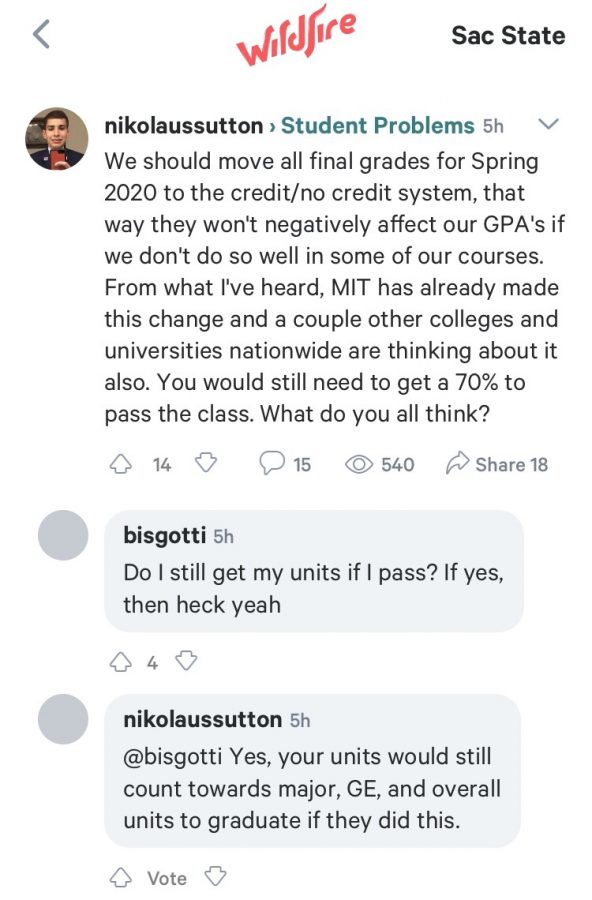Sac State ASI, admin discussing credit/no credit course expansion
April 3, 2020
Sacramento State’s Associated Students, Inc. and administration are discussing potential options for expanding credit/no credit courses in light of classes being moved online due to the COVID-19 outbreak, according to ASI.
Currently only about 12% of courses at Sac State can be taken for credit/no credit, and most of these courses are electives, said Israel Flores, ASI vice president of academic affairs.
Flores and ASI President Denisse Garcia have been in communication with multiple members of the university’s administration about expanding the list of credit/no credit courses to include major, minor and general education classes only for this semester, Flores said.
ASI is seeking student feedback about credit/no credit courses so they can move forward with what students want, Flores said. The ASI board has been asking for student feedback in their Zoom classes and is looking for other ways to find out what would be best for students.
“We are doing our research and requesting for student feedback to further understand the needs of our students due to the switch to online classes,” Flores said in an email.
Flores added that ASI wants students to know the advantages and disadvantages of a credit/no credit system.
Credit/no credit courses don’t affect GPA, which means the policy could potentially harm students who depend on a minimum of a 2.0 GPA to qualify for programs such as financial aid, athletics, study abroad programs and Student Organizations and Leadership organizations.
It could also negatively affect students who are looking to bring up their GPA to apply for graduate school.
However, the policy would help those who need to pass their courses in order to graduate and those who are not dependent on a minimum GPA.
Elizah Hernandez, a chemistry major at Sac State, said she thinks students should have the option of choosing regular grades or the credit/no credit system because some students want grades for graduate school, but others are struggling with online classes and their work environment.
“The admin should also have students’ best interest in mind, such as first generation students and low income students,” Hernandez said via text message. “Many of us don’t have internet, a computer, or a healthy home situation to be doing work at. We need to be honest and realize the students aren’t having a regular college experience and the administrators should accommodate us.”
Tanner Mason, an economics major, said he believes the credit/no credit system is “the only acceptable way to continue classes.” Mason said the quality of his education has dropped, while expectations have remained the same, which he says is already reflected in his grades.
“I’ve lost two full time jobs and I’m on unemployment,” Mason said via direct message. “Worrying about classes is really the last thing I want to do. There’s a huge strain on the student population that the campus just can’t possibly be aware of, and moving to (credit/no credit) would relieve a lot of stress on the students as well as give students some breathing room with their GPAs.”
Shawna Garayalde, a communication sciences and disorders major at Sac State, is against the implementation of a credit/no credit system.
“I, like many others, work hard for my grades and make a point of prioritizing school and my education despite what life throws at me,” Garayalde said via direct message. “I’ve been a student for a long time and have experienced so many life challenges, but was able to keep my education in focus and want to be recognized for that just like anyone else who works hard should.”
Students at Sac State have also been vocal about the credit/no credit discussion on social media.
Story continues below screenshots.
Universities across the country have implemented credit/no credit courses this semester due to the coronavirus outbreak, including: Notre Dame, The New School, Harvard University, Columbia University, UC Berkeley and Duke University. The universities have different names for the system, including pass/fail, satisfactory/unsatisfactory and credit/no credit.
At Duke University and UC Berkeley the credit/no credit system was implemented as the default grading system, although students can opt in to choose letter grades instead.
However, at Harvard University and Columbia University, the credit/no credit system is mandatory.
It is unclear how the implementation of credit/no credit courses would work at Sac State in regards to whether students or faculty would have a choice to opt into credit/no credit courses.
“At this time, we are considering what options there are for CR/NC courses, so it is premature to discuss specific options,” said Steve Perez, provost and vice president of academic affairs.
California State University Chancellor Timothy White said after consultation with the Academic Senate of the CSU, student leaders and campus leaders, they put together a set of grading policies that give campuses the flexibility to decide what is best for their students.
“One size doesn’t fit all with the CSU when it comes to things like this,” White said.
If you would like to submit feedback to ASI, you can email asivpaa@csus.edu.









































































































































Lauren • Apr 7, 2020 at 2:37 pm
Please consider pushing for students to have an option that their classes be taken for credit. Because of the scheduling issues imposed by COVID-19, it has taken me several weeks to get into contact with professors about assignment due dates and exam dates. At one point in March, I was taking care of my sick partner, forcing me to miss both school and work, which has caused me to fall behind in school. There is a lack of communication between faculty members regarding rescheduling: for example, for three classes in the next week, I will have four labs due and two exams. This means that I am forced to take a leave of absence from my work so that I can focus on completing my schoolwork. When I reached out to the department chair about my anxieties regarding how these issues would affect my GPA, as I currently have a borderline GPA and will lose my internship offer if I drop below a 3.0, he told me to not worry about them, and to focus on learning instead. I understand what his intent to emphasize the importance of learning, but I have to be concerned about GPA: I am in a financial situation such that I will not be able to afford school at all unless I have an internship. It is a luxury to be able to focus on learning alone, even when we are not in the middle of a pandemic. Many students have lost their jobs and have already had internship offers rescinded for the summer. Many students are parents that now have to watch their children full-time, and many of them are now unemployed. The quality of our education has also dropped, as many professors were completely unprepared to teach online classes. Forcing students who are concerned about their GPAs to withdraw without academic penalty does not mean there is a lack of penalty; rather, there is a semester’s worth of investment that is lost. If our school prides itself on its community, on accessibility, and on fairness, it should consider the needs of its students by allowing the option of C/NC, as no GPA-based financial stimulus will be lost. Enough of my classmates will not return to Sacramento State next year because of these aforementioned financial struggles that I do not believe it is necessary for the University to enforce such harsh standards in these unprecedented times. It is in times of trouble like these that we rely on our established institutions to listen to the needs of their constituents. To refuse leniency in the face of an international pandemic that is causing financial hardship to skyrocket is not only unempathetic, it is an institutional inequity.
J. Wheeler • Apr 6, 2020 at 9:45 pm
There’s a Change.org petition on this that a student put up: http://chng.it/ZsvHwqJ7Lj
Jamshid • Apr 3, 2020 at 11:02 pm
I think it will be better to let the students have the options whether they want Their class to be for CR or no NC.